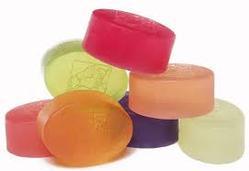Special soaps

Special soaps are these, which, due to their form and composition, can be considered as specific products of special importance or use in specific fields.
■ An example of a special soap is glycerin soap. It is tough, with high transparency. The basis for the production of this type of soaps is coconut oil, tallow, castor oil. In the process of saponification of the matrix, ethyl alcohol is added, and after saponification - glycerin and a 50% sugar solution, then dyes and fragrance oils. Glycerin soaps are characterized by a gentle action, that is why they are made for children and infants (in this version they should not be colored). Glycerin soaps can also be classified as toilet soaps.
■ Special soaps include textile soaps, intended for washing fabrics in the textile industry. These soaps are based on soft fats, forming soaps easily rinsed off at low temperatures, without rosin and highly unsaturated ingredients. A type of textile soap is Marseille soap, called Venetian or Castilian. It is a soda soap, hard, obtained by saponification of olive oil, possibly with the addition of coconut oil. It is characterized by high purity, low alkali content, light yellow or green in color. Marseille replacement soaps can be made from peanut oil and olein (mixtures of liquid fatty acids, mainly containing oleic acid).
■ Soap flakes and threads are made of sodium or sodium potassium soap. They do not contain synthetic surfactants. The warp for their production contains approx. 50% coconut fat and approx. 50% other vegetable fats, usually hardened, but with a low melting point. These products are easily soluble in water and are resistant to sedimentation in medium-hard water. Fragrances can be added to the petals and soap threads. Soap petals and threads are white or light cream, they are used for washing delicate linen fabrics, cotton and rayon. Despite the prevalence of detergent washing powders, There are soap flakes available on the market, e.g.. Persavon, and soap threads, e.g.. Bambino.
■ Special soaps also include powder soaps (soap washing powders). The properties and purpose of these powders are similar to soap flakes and threads. In addition to soap, they may contain water softeners and an addition of synthetic washing agents. Some soap powders, intended for washing white linen, they may also contain chemical bleaches. Currently, due to the prevalence of detergent washing powders, production of soap powders is declining. Soap anyway, albeit in small amounts, remains a component of detergent washing powders.
■ Greasy soaps (grey) are a typical example of special soaps, referred to as technical soaps. They are not used as washing and washing agents. Greasy soaps are potassium or potassium-sodium soaps obtained from inferior fatty raw materials. In Poland, they are usually produced in two types:
- 65% gray technical soap (contains 65% fatty acids), manufactured from tall oil; it is dense, master, dark yellow to brown homogeneous mass, characteristic smell and high foaming capacity,
- 40% gray technical soap (contains 40% fatty acids), made of oils: linen, rapeseed, sunflower, sesame, fish and blubber fats and animal fats; has a thick consistency, mazista, non-ductile, color from yellow to brown or brown-green, peculiar smell, but not annoying.
There are also greasy soaps filled with kaolin, talcum powder, water glass, crawling. Greasy soaps are used in the painting technique, in pharmacy, in horticulture and fruit farming and for economic purposes.
■ The special soaps also include liquid soaps. These are potassium soaps diluted with water, possibly with the addition of ethyl alcohol. They constitute the basis for the production of these soaps: coconut oil or vegetable oils of the sunflower or olive type.
■ There are many products made of soap, which can be classified as special soaps. These products include, among others:
- marine soap, foaming in seawater,
- rope powder, which is a powdered soap,
- toothpastes for removing very dirty substances from the hands,
- soap shavings and others.
In addition to sodium and potassium soaps, also metallic soaps are produced, which are salts of fatty acids, mostly stearic acid, and metals such as: knee, calcium, zinc, cobalt, copper, lead and manganese. These soaps are solids insoluble in water and not wettable by water. They serve as additives to oils, lubricants, for impregnating fabrics, for making napalm, cosmetic powders, in the paint and varnish industry and in the rubber industry.